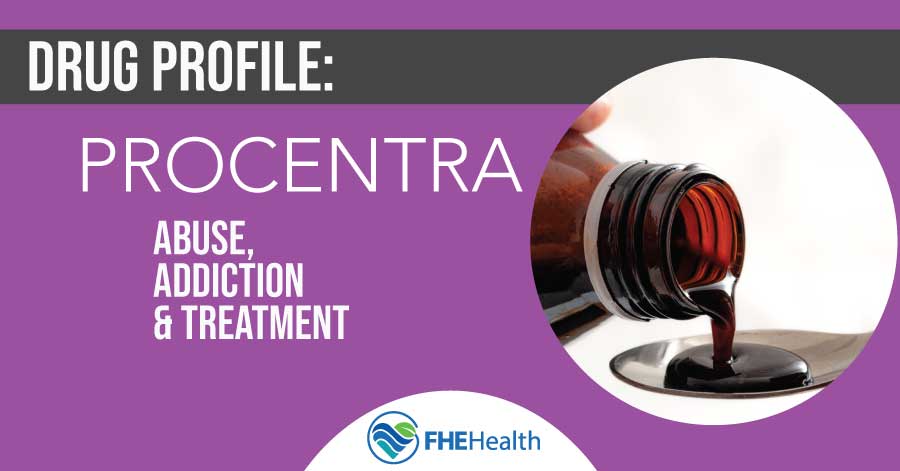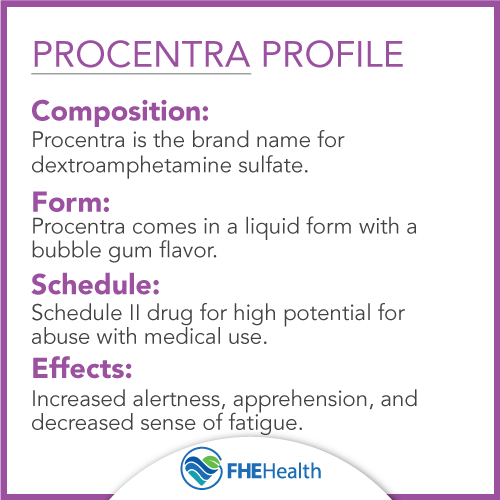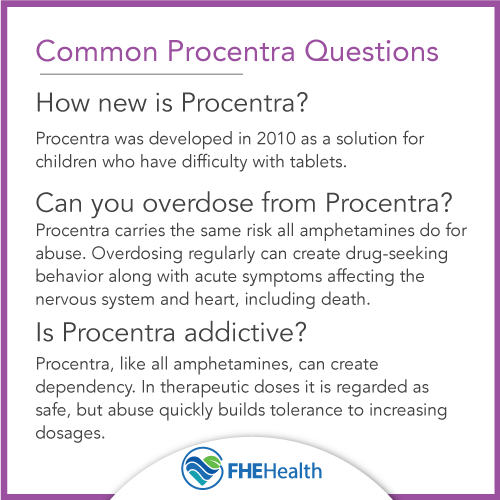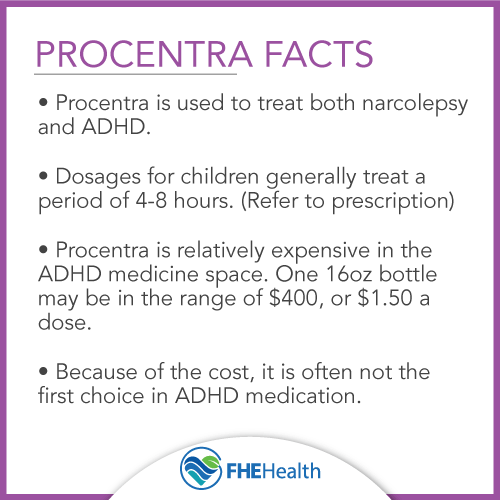
What is ProCentra?
 ProCentra is in a class of drugs used as central nervous system stimulants for the treatment of attention deficit disorder with hyperactivity (ADHD) and narcolepsy. Other brand names of d-amphetamine are the aforementioned Dexedrine or “Zenzedi.” ProCentra is one of the most popular short-acting stimulant prescription drugs, along with two other well-known brand names “Adderall” and “Ritalin.”
ProCentra is in a class of drugs used as central nervous system stimulants for the treatment of attention deficit disorder with hyperactivity (ADHD) and narcolepsy. Other brand names of d-amphetamine are the aforementioned Dexedrine or “Zenzedi.” ProCentra is one of the most popular short-acting stimulant prescription drugs, along with two other well-known brand names “Adderall” and “Ritalin.”
The drug is considered a DEA Schedule II Controlled Substance, which means it has a “high potential for abuse” and “may lead to severe psychological or physical dependence.” Because of their stimulating effects, the drugs in this class are often misused. D-amphetamine is known on the street as “dex,” “bennies,” or “uppers.”
How Is ProCentra Prescribed?
ProCentra is available in a clear, bubblegum–flavored liquid solution that is sugar-free. It is packaged in 16 fluid oz. bottles, with each 5mL containing 5 mg of dextroamphetamine. The bubblegum-flavored liquid makes it more palatable to pediatric patients with ADHD who may not be able to swallow tablets. The oral solution should be administered using a measuring device.
How Does it Work?
 ProCentra works by releasing specific natural substances in the body like adrenaline, and raising cortisol levels and other stress hormones. The “fight or flight” response that it initiates also causes increased heart rate and blood pressure. Changes also include blood flow that is redirected into the muscles and away from the brain.
ProCentra works by releasing specific natural substances in the body like adrenaline, and raising cortisol levels and other stress hormones. The “fight or flight” response that it initiates also causes increased heart rate and blood pressure. Changes also include blood flow that is redirected into the muscles and away from the brain.
These changes increase your ability to stay focused, to control behavior and your ability to pay attention. It may help with listening skills as well as the ability to organize skills. ProCentra is also used to treat the sleeping disorder narcolepsy, because it can help you stay awake— but it should not be used to treat tiredness. Small doses can help you feel alert and refreshed. Often, however, the energy boost is followed by a “speed crash” and leaves the user feeling depressed and exhausted.
It’s always important to know how long a drug stays in your system, as taking too much can have serious side effects. The duration of the effect of ProCentra is four to eight hours. Like any medication, however, multiple factors can come into play regarding the duration of the effects. These factors can include age, metabolism, other medications and personal medical history.
What Are ProCentra Rare and Common Side Effects?
Some side effects may occur as a result of taking ProCentra. Not all of these side effects may occur, but if they do they may need medical attention. Rare ProCentra side effects include agitation, delusions and seeing, hearing or feeling things that are not there. Other side effects in which the incidence is not known to include blurred vision, chest discomfort or pain, dizziness, headache, pounding in ears, twitching or twisting.
Some common psychiatric issues that may emerge with the use of the drug may include abnormal behavior, aggression/hostility, anxiety and/or depression.
Some side effects of ProCentra tend to go away as the body adjusts to the medicine. These can include changes in taste, constipation, indigestion, bad, unusual or unpleasant aftertaste, dry mouth and redness of the skin.
What Are The Signs of ProCentra Addiction?
Like any dextroamphetamine drug that is considered a prescription stimulant ProCentra can be highly addictive, particularly because of the “good” feelings it can induce:
- Better focus
- More energy
- An increase in alertness
- Suppressed appetite
- Euphoria
Substance abuse occurs when the drug is taken in amounts above what is typically prescribed or via alternate methods of administration. Abuse of Procentra can lead to negative side effects, some of which can be serious and potentially deadly, including:
- Difficulty thinking clearly
- Impaired memory
- Unhealthy weight loss and malnutrition
- Hypertension (raised blood pressure)
- Tachycardia (raised heart rate)
- Impaired eyesight
- Psychotic symptoms
- Tremors
- Seizures (highest risk in patients with seizure history)
- Heart attack
- Stroke
- Death
Mixing any kind of d-amphetamine with alcohol can be dangerous and is not recommended. Combining the stimulatory effects of the drug with the depressant effects of alcohol can cause elevated heart rate, high blood pressure and other negative cardiovascular effects. The mixing of these two substances is strongly discouraged.
 ProCentra’s addictive properties can mean that users experience difficult withdrawal symptoms and even medical complications when they try to come off the drug. For this reason, detoxing cold turkey at home is never recommended. A medically supervised detox, as part of an inpatient and outpatient drug rehab program, can help ease the withdrawal process, ensuring that users are safe and medically monitored.
ProCentra’s addictive properties can mean that users experience difficult withdrawal symptoms and even medical complications when they try to come off the drug. For this reason, detoxing cold turkey at home is never recommended. A medically supervised detox, as part of an inpatient and outpatient drug rehab program, can help ease the withdrawal process, ensuring that users are safe and medically monitored.





